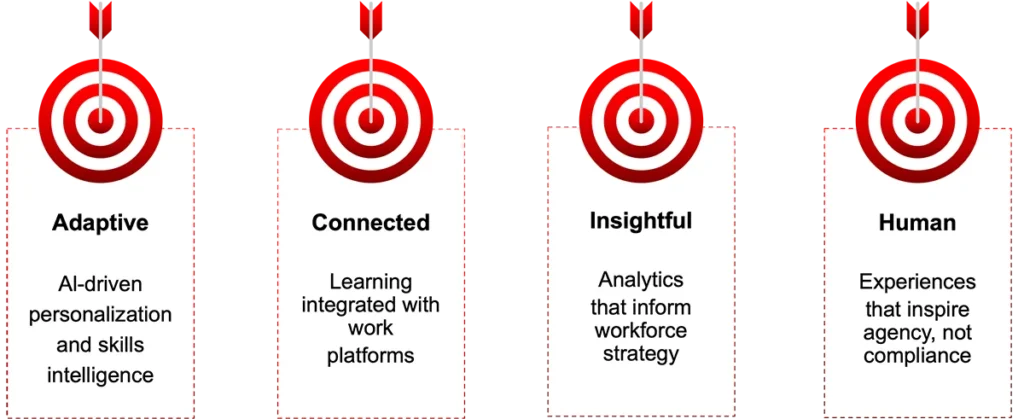How organizations can harness the perfect storm to build a new learning paradigm.
We find ourselves in an extraordinary moment. Organizations across Europe are confronted with a unique convergence of challenges: re-industrialization, geopolitical uncertainty, talent scarcity, demographic pressure, and, simultaneously, a technological revolution in which AI is becoming the engine of nearly every business transformation.
Together, these developments are creating a perfect storm.
A storm that demands action but also presents a historic opportunity: the chance to rethink how we learn, grow, and develop talent. Not incrementally, but fundamentally.
A HIDDEN ENERGY CRISIS IN THE WORKFORCE
Despite the urgent need for new skills, many employees feel stuck in existing roles or contexts. Not because they lack motivation, but because they lack space, direction, guidance. Research shows that employees feel unsufficiently supported in their efforts te acquire or develop the skills they need to cope with this changes. Which in turn explains why employees feel less engaged in their jobs.
And this is striking, because research consistently shows that learning fuels energy: it boosts motivation, engagement, and even retention.
Yet many organizations suffer from a hidden energy gap. Employees have the potential and the willingness to grow, but not the structures or language to turn that potential into momentum.
The challenge is therefore not merely a skill shortage.
It is a learning energy crisis that directly limits agility, innovation, and workforce adaptability. But it can be solved!
FROM COMPETENCIES TO SKILLS: A SIGNIFICANT LANGUAGE SHIFT
Traditional competency management once served a purpose, but it no longer fully fits the speed and volatility of today’s environment. Competencies are often too broad, too slow, and too static to support true agility.
That is why we advocate a fundamental shift: from competency management to skill management.
Skills are:
- dynamic
- specific and measurable
- transferable across roles
- natively compatible with technology and AI
- continuously updatable as roles evolve
It is the language employees understand and managers can use for strategic decision-making. It’s the language upon which tomorrow’s organizations will be built.
HOW WE HELP ORGANIZATIONS MAKE THE LEAP
The transition to skill management is not a software project. It is an organization-wide transformation that touches people, processes, and technology and requires clear governance and change management.
We support organizations in:
- Building a future-proof skill library: a shared and consistent skill language tailored to each organization.
- Uncovering the real needs: from skill gaps to role transitions, from strategic workforce requirements to urgent up- and reskilling priorities supported by data-driven insights.
- Aligning technology with learning and skill processes: ensuring systems actually provide insight and make skills visible in real time rather than creating additional administrative layers.
- Maturity assessments and roadmap design: we evaluate the readiness of HR, management, employees, and other stakeholders, and we turn that assessment into an actionable, phased plan with measurable milestones.
This approach does not create just new programs. It builds a new learning paradigm in which learning becomes an organizational force rather than an HR initiative.
THE NEW LEARNING: ADAPTIVE. CONNECTED. INSIGHTFUL. HUMAN.
The future of learning is not abstract! It is tangible and recognizable, represented in these four pillars, each reinforcing the others to create a coherent learning ecosystem:

When organizations embrace these four targets, something powerful happens: a culture emerges in which learning becomes a source of energy rather than an obligation where employees grow, technology accelerates, and transformation becomes continuous.
EXPLORE WHAT SKILL MANAGEMENT CAN MEAN FOR YOUR ORGANIZATION!
Do you recognize your organization in these challenges or ambitions?
Or would you like to understand how your organization scores across the four pillars of the new learning?
We warmly invite you to a non-committal exploration conversation!
Not a sales pitch, but a dialogue that provides clarity on where your organization stands today and what learning leap is possible based on concrete evidence and shared understanding.
Contact ACT-ON Belgium!
PS: To go further, how AI is driving skills transformation!






